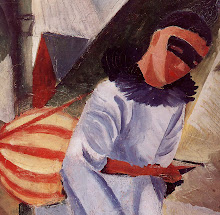
Pasquinade. (n.) A satire or lampoon, especially one that ridicules a specific person, traditionally written and posted in a public place. (tr. v.) To ridicule with a pasquinade; satirize or lampoon. [From the Free Dictionary.]
The word, it seems, is derived from the nickname - "Pasquino" - for a fragmentary statue in Rome. The statue, shown here, dates from the third century B.C. and was erected in a public
square in Rome in 1501. It supposedly depicts Menelaus holding Patroclus. (For those who slept through your Great Books courses, Menelaus and Patroclus were Greek heroes in the Trojan War.) Since the early sixteenth century, Romans have been in the habit of placing anonymous parodies and lampoons on the base of the statue; they can be seen in the close-up.

I came across this word while reading The Civilization of the Renaissance in Italy by the nineteenth century Swiss historian Jacob Burkhardt. Burkhardt was the first eminent scholar to address culture as a proper subject of historical inquiry; thus, in this great work, he describes the intellectual and social life of Renaissance Italy, rather than the great men and great battles of that time. Burkhardt recounts the "unhappy reign" of Pope Adrian VI, who was elected in 1522 but who died within two years. Adrian was a Dutchman - in fact, he was the last non-Italian elected pope until John Paul II - and the people of Rome never forgave him for this infelicity. The poor Adrian was an early target of Pasquino's eloquence.


No comments:
Post a Comment